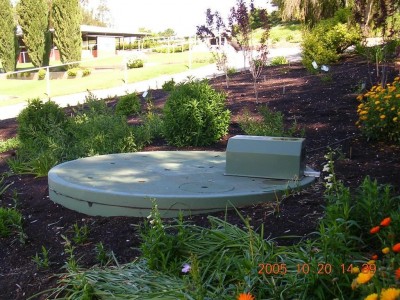08 8162 5544
Call us today for the best waste and recycling rates in Adelaide

Septic Tank Odours are Useful Indicators of Several Underlying Problems
Ever since the 1960s, the use of Septic Tank Effluent Disposal Schemes (STEDS) has become widespread in many townships in South Australia. These systems typically comprise a pipe network laid in the road reserve. The outflow of various household septic tanks connects to this network via onsite plumbing and connection points. Several low points in the network feature pump stations. These stations are useful for transferring the wastewater to a treatment site. In many cases, this treatment site could be a facultative lagoon, situated at some distance from the township.
What are Septic Systems?
Septic systems typically comprise septic tanks and their associated drain (or leach) fields. The septic tank contains several beneficial microorganisms (such as anaerobic bacteria) that break down (or digest) the waste into dissolved organic matter. Eventually, the digested waste flows out from the septic tank in the form of a liquid effluent. This effluent ends up flowing out into the drain fields. In many cases, the bacterial waste digestion processes produce some gas as well. To enable this gas to escape, septic tanks feature household plumbing vents.
The drain fields in a septic system typically denote a series of underground trenches lined with gravel. These trenches play an essential role in treating the waste organically. The bacteria present in the soil complete the decomposition of the liquid waste. These microorganisms digest the dissolved organic matter in the liquid effluent. As a result, this effluent becomes harmless. The waste continues percolating through the soil, towards groundwater aquifers. Eventually, the soil chemistry and temperatures end up eliminating most of the disease-inducing microorganisms that the effluent retains.
What Happens to the Undigested Matter in the Septic Tank?
It is worth noting that the anaerobic bacteria present in the septic tank digest most of the solid waste present in the tank. However, this does not mean that they can digest all the solid waste matter that the tank or the wastewater contains.
As mentioned earlier, the heavier undigested solids in the septic tank sink to the bottom of the tank. Here, these solids start forming sludge. At the same time, the septic tank also contains lighter undigested matter. This could typically comprise greases, fats and oils. This matter will float to the top of the tank and form a layer of scum. Any septic tank will feature baffle walls. These walls prevent the sludge and the scum from escaping into the drain field.
Naturally, over time, the sludge and the scum will continue accumulating inside the septic tank. If you fail to remove these from the tank, this waste matter could end up clogging the pipes of the system. Even worse, it could overflow into the drain field and contaminate the ground water. To eliminate these issues, septic system owners need to carry out regular septic system maintenance. This typically denotes pumping the accumulate sludge and scum out of the septic tank.
Most septic tanks require cleaning every three to five years. However, this frequency could vary based on factors such as:
- The size of the tank
- The amount of waste that the unit pumps into it
- The temperature of the tank that the septic system owners maintain and,
- The volume of non-biodegradable solid waste that enters the tank
Why Do Septic Tanks Emit a Foul Odour Sometimes?
When your septic tank starts smelling, avoid ignoring it. This odour typically indicates that there’s something wrong with your septic system. Some of the most common reasons for the escape of this odour include:
- An Overfilled Tank: A septic tank filled to capacity will hardly be as efficient as it should be. The accumulation of sludge and scum will produce a malodour. Consider calling a septic system pumping company. They will assess whether your tank requires emptying. Or, they might even be able to diagnose whether your system is failing.
- Improperly Sealed Tank or Tank Vents: Sometimes, the septic tank could emit a foul odour because of a damaged septic tank vent. Alternatively, if you have not covered or sealed the tank properly, this might cause the spread of the odour too. On occasions, septic tank owners have found that the odour continues to spread even after they have cleaned their tanks. In this scenario, it is likely that you might need to consult a septic tank inspector. This is especially so because the problem might concern your drain field.
- Damaged or Blocked Septic Tank Vents: Septic systems usually have roof vents for balancing the pressure. If something causes an imbalance, it usually produces a gurgling sound in the system along with the odour. To resolve this, you will need to inspect the septic vents for damage or blockage. If the odour persists even after cleaning the vents, you might need to install filters in the vent.
Signal Waste & Recycling – The Specialists in Dealing with Septic Tanks and Liquid Waste
When you require assistance with cleaning your septic system, depend only on an experienced firm. Since 1989, people in Adelaide and the adjoining areas have trusted Signal Waste & Recycling for top-notch services at the best rates. From waste removal to recycling, we offer an array of services. Our services cater to clients from the private, commercial, industrial, local, state and federal government sectors throughout the Adelaide metropolitan area. With innovative solutions and the latest equipment, we offer all our clients a peerless experience in waste removal. Call us at 08 8162 5544 for more details.




